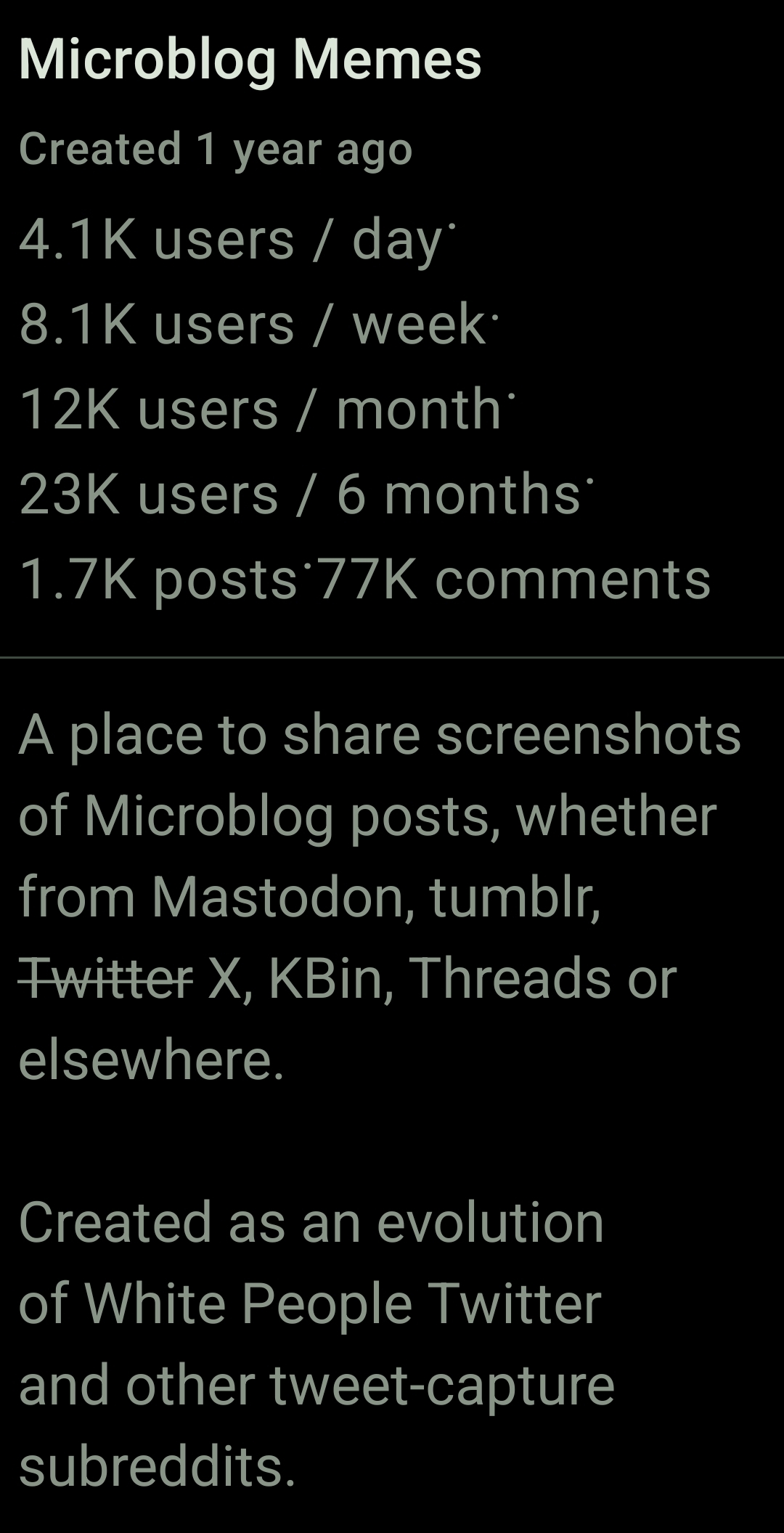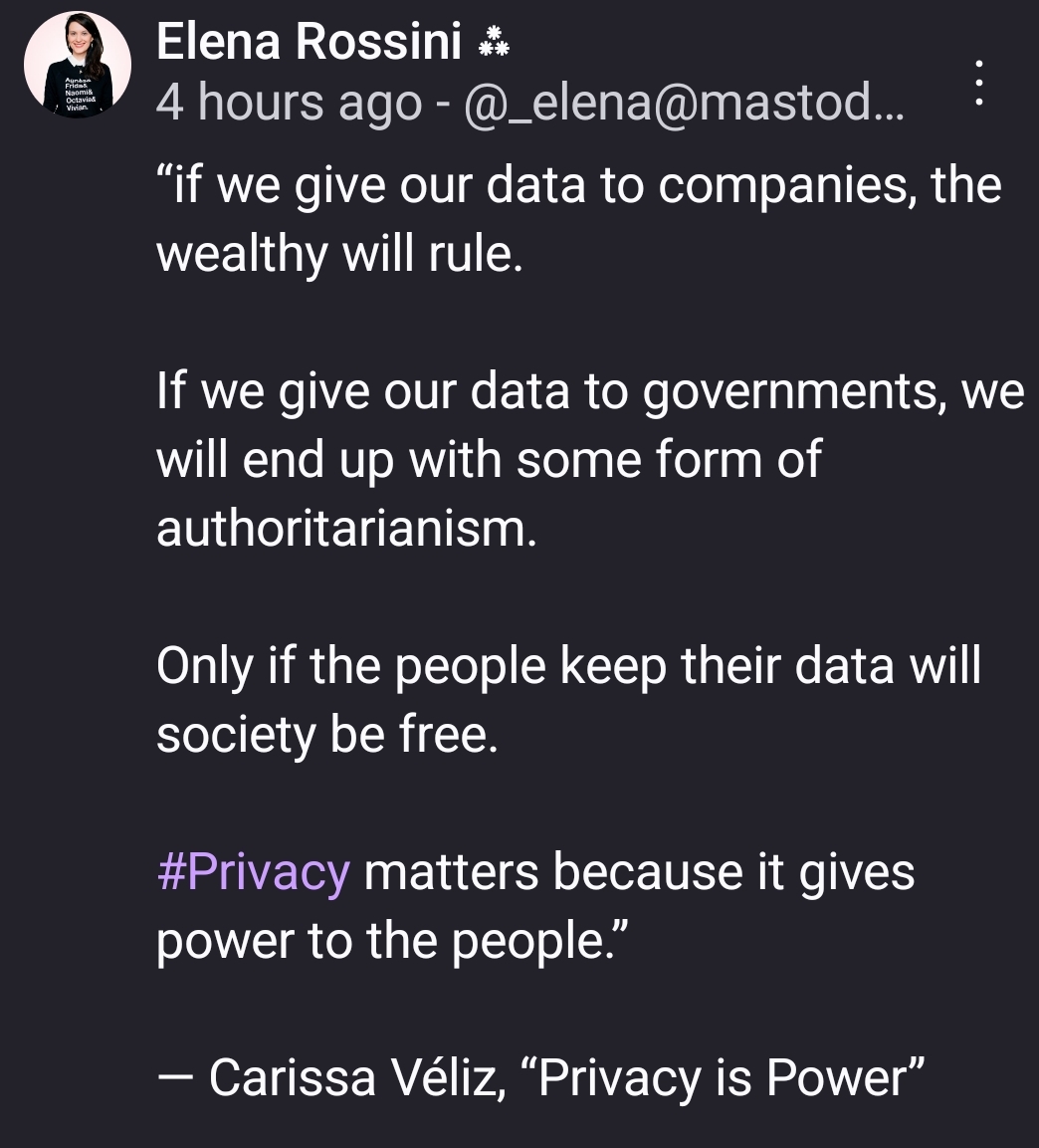You guys need to learn what a meme is.
Microblog Memes
A place to share screenshots of Microblog posts, whether from Mastodon, tumblr, ~~Twitter~~ X, KBin, Threads or elsewhere.
Created as an evolution of White People Twitter and other tweet-capture subreddits.
Rules:
- Please put at least one word relevant to the post in the post title.
- Be nice.
- No advertising, brand promotion or guerilla marketing.
- Posters are encouraged to link to the toot or tweet etc in the description of posts.
Related communities:
A meme is a thing thats shared, so this becomes a meme when it’s posted to share with others.
The hell do YOU think a meme is?
The hell do YOU think a meme is?
This, and exclusively this:

(I do not personally agree)

Nah, this is the only true type of meme
A continuously adapted and shaped image, text or video that gets shared relentlessly.
If something keeps getting shared unchanged, I wouldn't actually consider it a meme, only if it's altered. Otherwise I would just call it a viral post or video or something.
Actually, it's pretty hard to define a meme now that I try to think about it...
Why?
I think they were referring to this community being called microblog memes and this post kinda not being a meme per se

"I want convenience and I have nothing to hide, so I'm willing to give my data away."
Ok, but other people aren't.
Your vote affects other people.
It's great that your needs are met but people other than you will be hurt by this.
This is one of my greatest issues with my fellow citizens. They really don’t care about others, not even a little bit, when taken as a whole.
Meh. Pseudo-wisdom.
The wealthy rule with or without your information. They did just fine before the advent of scraping every data point about you off the internet, your phone, or card swipe. Your info today is just another datapoint in some company’s portfolio to be bought and sold.
Authoritarian governments get that way to protect wealth and power. It’s not your personal information that matters as much as what you say that matters. If you cannot be safe in expressing dissent and keep that private, then you’ve lost.
Information is an obscenely valuable resource and information asymmetry decides wars.
Yeah, tactical information. Locations of troops, resources, roads, bridges, opposition location, etc etc.
Not what I bought at the store.
Let’s not conflate the two.
All information is tactical information. Every bit of additional information strengthens control.
Knowing what every citizen buys from the store is an authoritarian government's wet dream.
Stop changing the subject to make yourself right.
You said “war” first, then you changed to “authoritarian governments.”
Pick one.
Don’t double down on your absolutist answer.
War is simply the most direct example. All information is power.
It's all identical. You're trying to distinguish between the exact same thing. Corporations aren't spending billions of dollars to spy on you because that information is worthless. It's incredibly effective as part of the process of changing behavior.
Spare me your histrionics. Just stop.
War is a blunt instrument. No Russian general is checking Ukrainian’s shopping lists. No Israeli official is checking what tiktoks the Palestinians are watching.
No, it is NOT all identical. You’re manufacturing scenarios that don’t exist. You've jumped from war to authoritarians to corporations just throwing as many darts at the board as you can while pounding the table and making huge leaps to conflate everything. There’s zero logic to your rant. Whatever.
Did you even read the OP? It's not just about war. It's about the power of privacy across the board.
The literal only thing splitting information into "tactical information" tells anyone is that the person doing so is clueless and absurdly unimaginative. Again, ignoring that totalitarian governments are completely within scope, "basic" spying has expose sensitive military installations, among many, many other things.
Did you even read my disagreement with the OP or did you just skip to my disagreements out of context?
Unfortunately, I did.
There is no context where your "disagreements" have a shred of merit. They're pure idiocy.
If you give your data to companies, they'll sell it to the government, circumventing legal processes that are supposed to protect against warrantless spying.
I have nothing to hide: takes lock off front door, removes pin from phone, tells everyone who asks pin to debit card, accepts all cookies automatically, fills out invasive surveys for vouchers.
I was having a parking dispute with my apartment manager where I was borrowing a vehicle while mine was in the shop. She sent a warning letter to not park it there. After unsuccessfully trying to state my case, I asked to speak to the owners for their understanding. She said absolutely not and refused to give me any information about them. I decided to do some online research with her name and company to find out the owner's identity but was only able to find her arrest history instead, I even found her date of birth and address. It turns out she was arrested three times for drunk driving and being under the influence of other narcotics with the last time happening just months before.
I can find some dirt that could potentially be used to blackmail my manager but couldn't find a single piece of information about the owners of a large apartment complex. Privacy is indeed power.
always hass been. personal datas are new oil of world
The first part is true. Why would you want corporations knowing about you. But the government part doesn't make sense. Why should your data be kept from the government? The government is the one organization I trust with my data because they hold records on every single citizen and have no monetary incentive to sell or misuse it.
My data in this case being stuff like Name, Address, workplace, family, medical history, employment history, friends.
Stuff I wouldn't want the government knowing would be my hobbies, my chatlogs, my search history. If they want that they should get a warrant.
I'm OK with the government buying/collecting and using stuff like location data if it's anonymized. I understand this stuff is needed to see general trends in the population and plan accordingly.
What she is talking about is the data the Chinese government collects about its people like where you go when, who you meet, what you buy, what you talk about, who you're friends with, if you are pregnant or not, etc.
Or what the NSA collects about Americans... like where you go when, who you meet, what you buy, what you talk about, who you're friends with, if you are pregnant or not, etc.
It's what decisions are made with that data that's the concern. A lot of "privacy advocates" believe that society can exist with the government not knowing anything about their population. I can't think how:
- a transport service can operate without knowing where people go and when
- consumer advocacy can work without knowing what people will buy
- what needs to be addressed in society without knowing what the issues are
- what to educate people on unless you find out what they don't know
- a health service can adapt to the needs of aging populations without good fertility data
You're right, all this data can be used against someone for malicious reasons and like in the China example it's easier to locate dissonance by listening. But evil can be done without data collection, it's impossible to do good without it.
You don't need personalized data to do those things. You can just count how many people use the bus instead of checking for every person where they are going when and why.
I agree that aggregate data is the best way to improve things for the most number of people, you can't help every single person, but also knowing the edge cases helps you find out things you don't know.
Thanks for providing context I probably should have checked to see what she was referring to.
The duch have a specific data set they hoped not to have collected. They collected everyone's religion.
So when the Nazis came it was especially easy to find all the Jews in the Netherlands. In other countries they had to collect that data first.
Yea but I don't blame the Dutch for collecting that data since it was the Germans going door to door looking for jews. They did that because they wanted to not because they had the data to do it.
What about when a government decides that you must wear a special armband for being Jewish or Roma or gay?
How is that relevant?
That's typically the argument regarding being apprehensive about the government knowing your medical & family history; there's historical precedent of governments making very not good laws based on those.
Before WW2, the nazis basically outlawed being Jewish or Roma. A more recent example would be outlawing being gay or trans in some countries
I'd argue there's a much bigger historical precedent or governments not abusing that information and instead using that info to make informed policy decisions.
If your government does that you have bigger problems than personal privacy and data collection.
I do agree with you on that. I think it's worth considering but it's not inherently decisive
The government is the one organization I trust with my data because they hold records on every single citizen and have no monetary incentive to sell or misuse it.
My government buys my raw fucking web traffic from my service provider.
Privacy is power and by stealing privacy yout get the power.
The thing that is valued the most is convenience or we wouldn't be in this situation
Privacy.. who gave you that private info in the first place?
Is it your bank account # or the banks? Is it your ss# or the governments Is it your email address or Google's?
